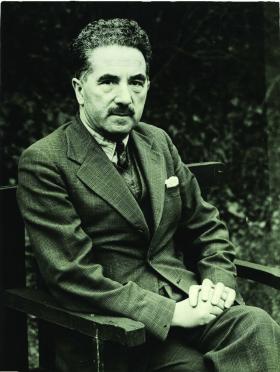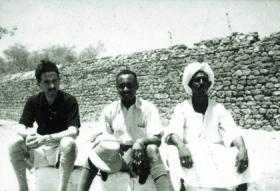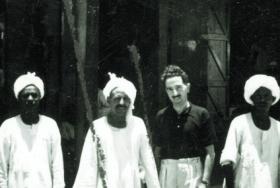Imperial pipedream—Joseph Walshe’s 1938 trip to the Sudan
Published in 20th-century / Contemporary History, Issue 6 (Nov/Dec 2006), News, Volume 14 During Ireland’s ‘golden years’ at the United Nations in the late 1950s Dublin firmly supported decolonisation and the newly independent African states then joining the UN. Ireland prided itself upon never having sought to dominate another people for colonial greed. Yet a May 1938 letter from Joseph Walshe, contained in the recently published fifth volume of the Royal Irish Academy’s Documents on Irish Foreign Policy series, offers a different take on these widely held sentiments. Walshe, head of the Irish diplomatic service from 1922 to 1946, suggested another Irish perspective on Africa.
During Ireland’s ‘golden years’ at the United Nations in the late 1950s Dublin firmly supported decolonisation and the newly independent African states then joining the UN. Ireland prided itself upon never having sought to dominate another people for colonial greed. Yet a May 1938 letter from Joseph Walshe, contained in the recently published fifth volume of the Royal Irish Academy’s Documents on Irish Foreign Policy series, offers a different take on these widely held sentiments. Walshe, head of the Irish diplomatic service from 1922 to 1946, suggested another Irish perspective on Africa.
During the 1930s Walshe travelled widely during his annual leave on unofficial fact-finding missions ‘encouraged’ by de Valera, who was kept ‘informed of conditions’ wherever Walshe went. Walshe visited Palestine and Egypt in 1937 and Egypt and Sudan in 1938—a colleague writing that the 1938 trip ‘certainly surprised me. [Walshe] is apparently in the mind of going Arab’. Walshe arrived in the Sudanese capital Khartoum by flying boat from Cairo in early May 1938. A week later he wrote to de Valera that he had ‘done quite a lot of exploring in spite of a shade temperature of 105 degrees during the day and 95 degrees at night’. Omdurman, north of Khartoum, was ‘very interesting’; Walshe met ‘some old warriors’ who had fought the British in 1898. It was peaceful, ‘the festival of the birthday of the Prophet’ was taking place, and although there were ‘tens of thousands of Arabs in the two adjoining cities of Khartoum and Omdurman’ there was not ‘a trace of disorder’.
Criticising British rule in Sudan, Walshe explained to de Valera that the descendants of the rulers of Sudan before British occupation, the ‘sons of the Mahdi and of the Khalif who succeeded him are local potentates . . . no doubt enjoying fat salaries from the British’. He speculated that they were ‘close friends of the governor-general’ of Sudan, Sir Stewart Symes. As Walshe got to know Symes and his policies, his initial sarcasm towards British rule gave way to interest and, ultimately, to an attraction that saw benefits for Ireland.
Walshe travelled south-east from Khartoum to the cotton-growing region of Al-Aswat ‘in an old Ford car . . . following a desert track along the line of the Blue Nile’ to Barakat, ‘the centre and the administrative headquarters of the great cotton growing area’. He was keen to see how Britain administered the region and Symes obliged, providing ‘every facility to see and understand how British rule operates’. Plans to explore further were shelved, and ‘were it not for the intense heat we should have given into [the] temptation to continue for another 200 miles to the Abyssinian border’. Walshe was moving into terra incognita for a European. He told de Valera how ‘the people, who get blacker and blacker as you go further south, are invariably very courteous’, adding that ‘you are not in the least disturbed at not meeting any white people’.
Returning to Khartoum, Walshe again met Symes. The governor-general was ‘a very decent fellow’ and ‘a close friend’ of Paschal Robinson, the papal nuncio in Dublin. Married to an Italian Catholic noble, Symes’s Italophile outlook was in tune with Walshe’s world-view. Walshe saw Symes as an ‘idealist’ with ‘very long experience in the Near East Africa’, not ‘the narrow-minded imperialist one expects to find in a post such as this’. In contrast to the last decades of British rule in Ireland, Symes could ‘go where he likes here with a few unarmed policemen’. This idealistic imperialism appealed to Walshe:
‘He is making no effort to anglicise the people. English is not taught in the schools though no doubt it will be when a Sunday school system has been established. He makes all the officials learn and speak Arabic and the local dialects.’

Walshe in Khartoum, 1938. ‘Walshe took what he had learned in Sudan to heart and asked the taoiseach to “give a little thought to the question of a colony when you have leisure”.’ (UCD/OFM partnership)
Though he never mentioned Ireland when writing to de Valera, Walshe clearly contrasted Symes’s policies favourably against the ‘Anglicisation’ of Ireland in the nineteenth century and set Symes’s language policy in contrast to the treatment of the Irish language in nineteenth-century Ireland.
While Symes’s obituary described him as having ‘a friendly surface manner’, he ‘was not an easy man to get to know’. Walshe did not appear to understand that Symes was strengthening traditional local authorities in north Sudan to reduce the influence of Sudanese nationalists. Neither did Walshe make any reference to Symes’s running Sudan as two separate colonies, the three provinces of ‘Southern Sudan’ being a ‘closed district’ to outsiders and northern Sudanese. Walshe did not see the malign in Sudan, and he simplified and was taken in by what he perceived to be benign. Supporting British imperialism, he told de Valera that ‘the British could stay here for centuries if they had always men of Symes’ type to do the Governing for them’.
In an apparently genuine suggestion to de Valera, though one which goes against all the norms of Irish foreign policy, Walshe took what he had learned in Sudan to heart and asked the taoiseach to ‘give a little thought to the question of a colony when you have leisure. It would be a splendid training ground for our people, and colonial budgets can be made to balance without subsidies from the home government’. The two sentences stand out in the history of Irish foreign policy as probably the only time that any Irish diplomat suggested to de Valera or any other senior political figure that Ireland develop an empire in Africa.
The apparently genuine remark to de Valera resulted from immersion in British policies in Sudan and shows that Walshe perceived an Irish colony in Africa as a way to cultivate the Irish administrative élite. The desire to balance budgets without the involvement of Dublin suggests a self-sustaining, self-sufficient entity, a colony that would be a government and administrative training school in Africa. Walshe made no mention of how indigenous peoples in this colony might fare, and one wonders whether Walshe saw himself as the colonial governor-general running Ireland’s place in the sun.
Walshe never developed the idea further. There is no suggestion as to where Ireland’s African colony might be situated. Walshe left no papers, and no written reply to his suggestion exists in de Valera’s private papers. One can speculate that de Valera did not give the request much thought.
 Two sentences in a long letter might be dismissed as a throw-away remark, but that was not Walshe’s style. Neither was he known for having a dark sense of humour. He wore his heart on his sleeve and wrote what he thought, and what he thought was deeply held when he wrote it. Walshe was unduly influenced by what he saw around him in Sudan and his letter reflects his immediate experience in the country. It is in this light that his Sudanese adventure and call for a colony should be seen. But before dismissing the suggestion for an Irish colony in Africa out of hand, we should remember that it was the senior foreign policy adviser to the taoiseach who called for Ireland’s late arrival in the scramble for Africa and that it was apparently made in good faith.
Two sentences in a long letter might be dismissed as a throw-away remark, but that was not Walshe’s style. Neither was he known for having a dark sense of humour. He wore his heart on his sleeve and wrote what he thought, and what he thought was deeply held when he wrote it. Walshe was unduly influenced by what he saw around him in Sudan and his letter reflects his immediate experience in the country. It is in this light that his Sudanese adventure and call for a colony should be seen. But before dismissing the suggestion for an Irish colony in Africa out of hand, we should remember that it was the senior foreign policy adviser to the taoiseach who called for Ireland’s late arrival in the scramble for Africa and that it was apparently made in good faith.
Michael Kennedy is the Executive Editor of the Royal Irish Academy’s ‘Documents on Irish Foreign Policy’ series.
















